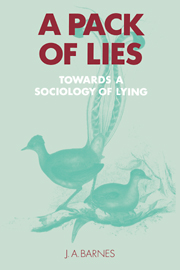Book contents
- Frontmatter
- Contents
- Preface
- Acknowledgments
- 1 What is a lie?
- 2 Where lies are expected
- 3 Ambiguous domains
- 4 Science
- 5 Cultural diversity
- 6 Relations
- 7 Self-deception and connivance in deceit
- 8 Telling and detecting lies
- 9 Benign untruths: the discourse of fiction
- 10 Evaluations
- 11 Do we have to have lies?
- References
- Index
11 - Do we have to have lies?
Published online by Cambridge University Press: 29 August 2009
- Frontmatter
- Contents
- Preface
- Acknowledgments
- 1 What is a lie?
- 2 Where lies are expected
- 3 Ambiguous domains
- 4 Science
- 5 Cultural diversity
- 6 Relations
- 7 Self-deception and connivance in deceit
- 8 Telling and detecting lies
- 9 Benign untruths: the discourse of fiction
- 10 Evaluations
- 11 Do we have to have lies?
- References
- Index
Summary
EVOLUTIONARY PERSPECTIVES
Lies, we have seen, are a mixed blessing. If we wanted to, could we stop telling them? If we cannot do away with our ability to lie, and/or we prefer to continue to lie, how much lying should we aim at? In this final chapter I put forward a decidedly woolly answer to the second question and, I hope, a rather more definite answer to the first.
We can all agree that lying has been a human activity for a long time; but just how long has it been with us? We might argue that the more recent its first occurrence, the easier it might be to eradicate it. We know that lying was a recognized phenomenon in classical Greece three thousand years ago. We can only guess what happened earlier but if, suppose, lying was an innovation arising out of the agricultural revolution some ten thousand years ago, it would then be not an ineradicable human characteristic; it would be rather the product of a change in economic life and hence potentially open to modification or even eradication with further economic changes. On the other hand, if lying has been possible for humans for many more thousands of years, the prospects for curbing the propensity to lie are much dimmer.
In the past many writers assumed that the contemporary way of life of pre-literate communities, particularly those of hunters and foragers, provided evidence for how all humans, including our own ancestors, lived in prehistoric times.
- Type
- Chapter
- Information
- A Pack of LiesTowards a Sociology of Lying, pp. 147 - 168Publisher: Cambridge University PressPrint publication year: 1994

